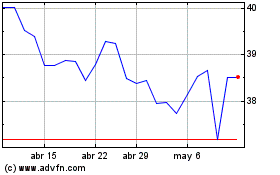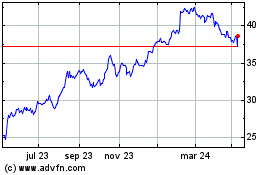By Keach Hagey
Facebook Inc. on Tuesday agreed to restore news to its platform
in Australia, following a five-day blackout that came amid a
standoff with the country's government over a proposal that would
force tech companies to pay news publishers for content.
The current showdown, which also involves Alphabet Inc.'s
Google, represents the boiling over of a long-simmering question
around the world: Should big tech platforms have to pay publishers
for the news articles that populate their sites?
Why haven't Google and Facebook had to pay for news?
Google and Facebook say they help publishers by delivering
traffic. In their view, requiring the tech companies to pay to
display news content violates the principles of open linking that
make the web work. Publishers say that the primary reason they
don't get paid is the power imbalance between them and the tech
platforms, whose role in the distribution of their stories is so
important that publishers feel they have little choice but to
assent to tech companies' terms.
Copyright laws differ by country, but in the U.S. the news
headlines and snippets turned up in Google searches are typically
considered a fair use of that content under copyright law --
meaning that a company can display those snippets without having to
negotiate a license fee from the copyright holder. Determining what
should count as fair use is complicated; it includes weighing such
factors as whether a news snippet on a tech platform could be
considered a replacement for the full article, which would harm the
publisher.
Whether Google's and Facebook's current use of news content is
fair use isn't known because the courts haven't tried a case. A key
legal decision from 2007 offers a guiding principle for what
copyright lawyers expect today. In that case, Perfect 10, a
publisher of pornography, had sued Google, claiming the thumbnail
photographs indexed in Google's image search had hurt its business.
The Ninth Circuit sided with Google, primarily because it saw
Google's search engine as a "pointer" to Perfect 10's content, not
a replacement for it.
Google has cited the ruling, and others, to argue that it
respects publishers' copyrights.
Why do publishers think Google and Facebook should pay for
news?
Publishers argue that Google's business has massively changed
since the Perfect 10 ruling in 2007. In Google's early days, a
search turned up a list of links to publishers' websites. Today,
Google often tries to answer users' queries itself, filling the top
of its results page with large images and text often plucked from
publishers that make it less necessary for users to click through
to a publisher's link.
Facebook users can argue back and forth about a linked news
article based on a headline and image that they may never click on
-- and thus never arrive on the publisher's page. Meanwhile, the
social-media giant can monetize the attention and engagement
generated by the post with its own ads.
Google and Facebook have grown into ad behemoths, with
advertising accounting for the vast majority of their revenue last
year, $181.69 billion and $70.7 billion, respectively. In contrast,
the news-publishing industry's ad revenue has steadily
declined.
How have governments stepped in?
Governments around the world have been moving to shift the
balance of power between big tech platforms and news organizations
as the financial disadvantage of the news industry in the current
model became clear.
In 2019, the European Union changed its copyright laws to allow
publishers to ask tech platforms to pay for using snippets of their
content. When France became the first country to implement the
directive, Google lobbied hard against the law and threatened to
shut down Google News if it were forced to pay for licenses. In
January, Google inked a deal with a group of French publishers to
create a framework to pay them for online news.
In the U.S., a bipartisan bill has been kicking around Congress
for the last several years that would give news publishers the
right to band together on a temporary basis to negotiate with
Google and Facebook. The bill hasn't been reintroduced in the
current session.
Australia is expected to pass a tougher version of such
regulation, which would require tech platforms over a certain size
-- meaning, Google and Facebook -- to engage in "baseball"
arbitration with news publishers to come to an agreement on payment
for news. The arbitration method entails two sides who can't reach
a deal each presenting a single final offer, and the arbitrator
picks one. In this case, it is designed to level the playing field
between the tech giants and the publishers with whom they are
negotiating.
How have the tech platforms responded?
In the years leading up to the Australian showdown, Google and
Facebook responded to growing pressure from publishers and
politicians by tossing money at news publishers while digging in
hard on the core copyright issue. The payments have taken various
forms, from grants to new products like the Facebook News Tab or
Google News Showcase, which enable the tech platforms to pay for
some content on their terms.
Both Google and Facebook initially approached the proposed
Australian law the same way -- by threatening to shut down their
services in the country if it passed. In a December blog post,
Google called Australia's proposal "unworkable."
Their strategies later diverged: Google announced a three-year
global deal with News Corp, the parent company of The Wall Street
Journal, worth "tens of millions" of dollars to license News Corp
content for various products. Facebook, meanwhile, made good on its
threat to remove news from its platform and did so on Feb. 18.
William Easton, managing director of Facebook in Australia and
New Zealand, said the company has a different relationship to news
than Google does because "publishers willingly choose to post news
on Facebook," whereas Google search crawls the web.
Mr. Easton also said Facebook's business gain from news was
minimal. "News makes up less than 4% of the content people see in
their News Feed, " he said.
Traffic to Australian media outlets plummeted shortly after
Facebook acted. According to data from analytics firm Chartbeat,
Australian publishers saw traffic from readers outside the country
decrease by about 20% in the hours after Facebook cut off sharing
of news articles for its users there.
On Tuesday, Facebook agreed to restore news to its platform in
Australia, following a deal with the Australian government that
would give it more time to reach individual agreements with
publishers before the arbitration process began, among other
changes.
Write to Keach Hagey at keach.hagey@wsj.com
(END) Dow Jones Newswires
February 23, 2021 14:18 ET (19:18 GMT)
Copyright (c) 2021 Dow Jones & Company, Inc.
News (ASX:NWS)
Gráfica de Acción Histórica
De Mar 2024 a Abr 2024

News (ASX:NWS)
Gráfica de Acción Histórica
De Abr 2023 a Abr 2024
